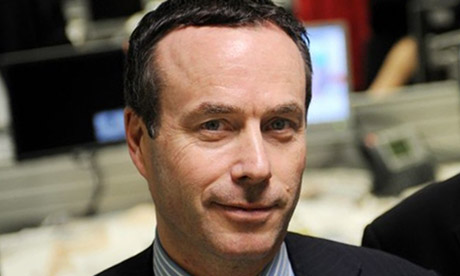Death of News Reporting?
Sasha Abramsky sees the eminent demise of journalism as we know it, as major papers eliminate their foreign news bureaus and online delivery makes news content “just another commodity.”
Too many people are now ditching their newspaper subscriptions, relying more heavily on internet publications and online clipping services. If these organisations were recreating their own news-gathering infrastructures, that wouldn’t necessarily be a problem. The flaw in the model, however, is that businesses like Yahoo rely on news bureaus run by newspapers and other traditional news organisations, in order to reap their own headlines. They then cull these stories for audiences to whom they distribute the information free of charge.
The model works well if people use Yahoo as a secondary source – to, say, get a quick glimpse at the latest news as a supplement to their morning paper – or if only a select few use it as a primary source for news. It works terribly if a critical mass of readers cancels their newspaper subscriptions and relies exclusively on the freebies available via the web. For at that point, the financial viability of the news organisations comes into question – as it has at the LA Times – and the possibility grows of a news-gathering infrastructure breakdown. If the LA Times doesn’t generate news from places like Iraq, how will Yahoo, which doesn’t operate its own bureaus, maintain a reliable stream of professional quality reporting? In a very real way, the internet risks killing off the goose that keeps laying its golden eggs.
Why must the centuries-old model of printing news on paper, distributed by a cadre of delivery people, and tossing it on people’s lawns continue forevermore? Surely, the NYT, LAT and others are charging YahooNews a fee for using their content? Not to mention making significant advertising revenues off their sites?
Further, isn’t news reporting to a certain extent a commodity? Do we really need dozens of reporters sitting around transcribing Tony Snow’s press conferences? Does the Washington correspondent from Paduka really add any value? And how many of those foreign bureau reporters are doing essentially the same thing, sitting around CENTCOM headquarters waiting for the next presser?
The very best national journalists and foreign correspondents will continue to ply their trade. If the LAT closes their overseas bureaus, their best and brightest will be snapped up by the NYT and others who have the resources to invest in outstanding foreign coverage. That’ll add to their prestige and increase their quality.
Further, while the online world is changing the world of journalism, it’s not destructive without also being creative. The New Media is making it clear that there are tons of experts out there who actually understand the issues they’re writing about much better than journalists with B.A.’s in English Literature who parachute in to cover a story. Indeed, the publisher of the Atlantic Monthly is looking to hire 300 experts, many of them bloggers, for his empire. If this catches on, we may well come out ahead.
via Romenesko






The usually liberal press being resistant to change…. I’m sure there’s a moral in there, somewhere.
The writer makes a legitimate point … sort of. Her problem is one of myopia: She seems to sincerely believe that if salaried employees of established media operations don’t cover the news, then it won’t get covered. In reality, far too often, the salaried employees of established media operations fail to cover important stories, or do so with such bias, that it falls to the New Media to provide coverage.
I must disagree with OTB one one thing, though:
Reporters do far more than transcribe. They ask questions, and they interpret the answers. Would you want the only reporters at Tony Snow’s next conference to be from Air America and NPR? Or, would the left want the only reporters there to be from Fox News and the Washington Times? I think a crowded press conference is more likely to keep the questions, and the reporting, comprehensive enough that the “real story” is likely to be told.
There is a great doctoral thesis out there looking at how many stories are re-writes of press releases (the drone scribe), how many were analysis pieces not covered in the blogosphere (note this is not new information, but analysis of already reported information) and how many are the result of really good journalism (the intelligent question).
KC Johnson and Durham in Wonderland has done a much better job of reporting than the MSM on the non-rape scandal.
The economics of all this is real interesting. What is the value to me of someone sitting in a Hagel news conference? The network news and lots of reporters spent good money to cover it. But could a press release from Hagel have achieved the same utility to me and most everyone not named Hagel? Especially when “free” blog commentary can put the press release in perspective. I understand the idea of the value in the abstract, but lets look at the particulars. What business model would allow me to get access to the content I want, compensate the content gatherer and standup to the incredible ease that content can be duplicated. The current model is I pay for a news subscription (heavily subsidized by advertisers who hope I will follow the breadcrumbs of their advertisements) or watch TV/listen to the radio with likewise motivated advertisers footing the bill. In turn, these news gatekeepers hire reporters to gather content. But how long is that model going to hold up?
It seems to me that about 80% of the time, what I read on the internet and what I see on cable news is nothing more than a re-hash of original reporting done by one of only a handful of newspapers that still do original reporting (NYT, WSJ, LAT, WaPost).
Heaven help us if those newspapers were to fail.
I think a certain amount of decentralization to the media is sensible both practically and economically speaking. Instead of having the US based NYT have a foreign press office in Japan, for instance, why not have them pick up stories by solid local reporters of Japan?
I’ve wondered how long the finance guys would take to seriously question the expenses of news-gathering when it has been increasing obvious that more and more of the “news” is fiction.
Why pay for a foreign bureau (in Iraq, for example) when you can pay a college kid Bush-hater to make up the same BS right here?
I see the WaPO advertising for “reporters” to go to Iraq. What a joke.